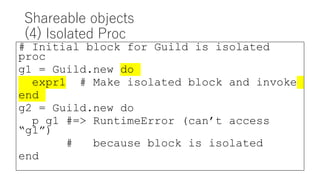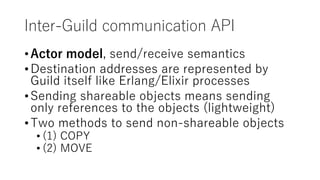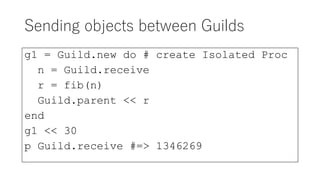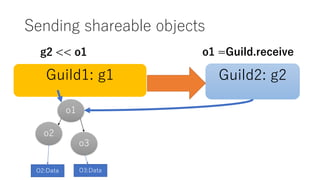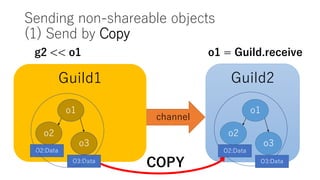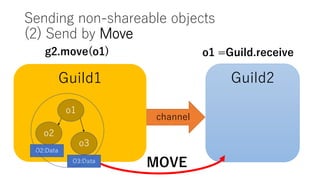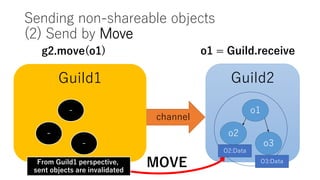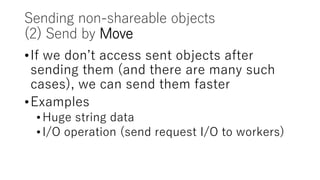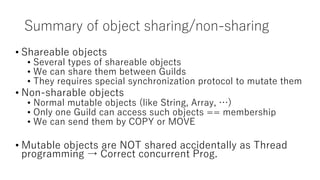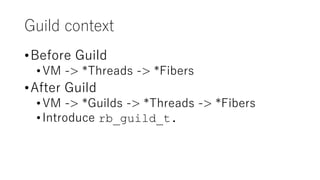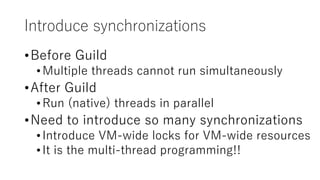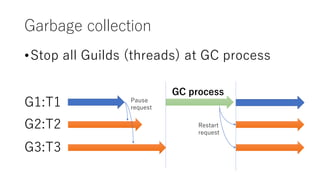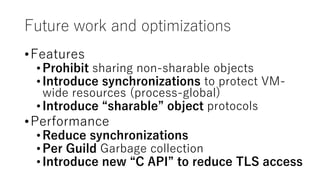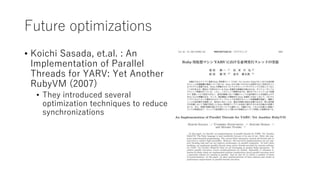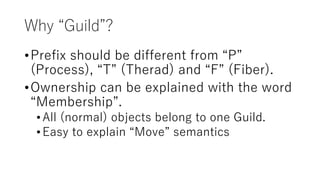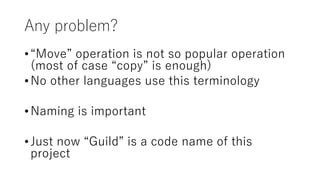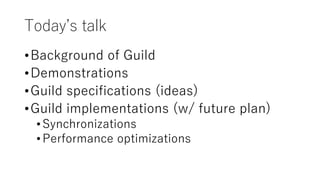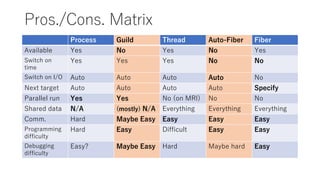The document discusses Guild, a new concurrency abstraction for Ruby that allows parallel execution across Guilds while avoiding data races. It provides demonstrations of Guild performance on a 40 vCPU system. Guilds allow sharing immutable and specially defined mutable objects between Guilds, while normal mutable objects cannot be shared to avoid data races. Inter-Guild communication uses an actor model with sending/receiving semantics. Non-shareable objects can be sent between Guilds either by copying or moving ownership.


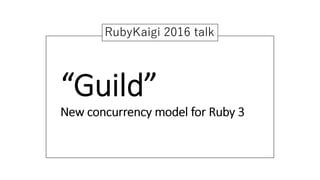
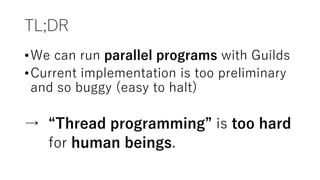
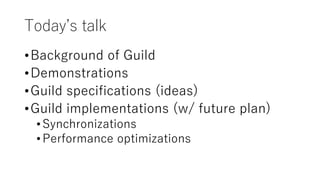

![Recent achievements for Ruby 2.6
•Speedup `Proc#call` … x1.4 improvements
[Bug #10212].
•Speedup `block.call` where `block` is
passed block parameter. [Feature #14330]
(x2.62).](https://image.slidesharecdn.com/2018rubykaigi2018-180607124730/85/Guild-Prototype-7-320.jpg)


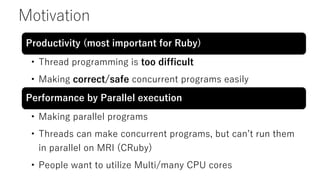
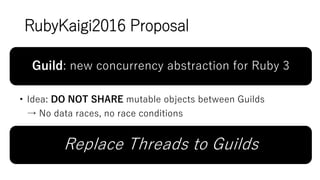
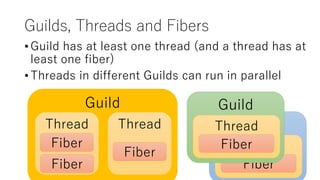
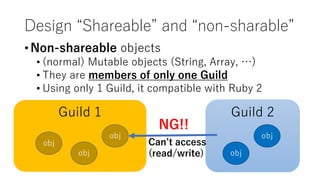

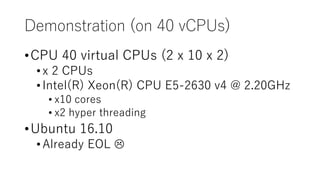
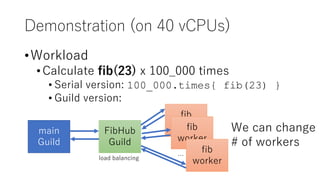
![FIBHUB = make_worker_hub do |n|
[n, fib(n)]
end
# library
def make_worker_hub n_workers = WN, &worker_proc
pp WN: n_workers if $VERBOSE
Guild.new(n_workers, worker_proc) do |nw, wp|
guilds = nw.times.map do
Guild.new do
while data = Guild.receive
result = wp.call(data)
Guild.parent << [:ans, Guild.current, result]
end
end
end
requests = []
while true
cmd, sender_guild, data = *Guild.receive
case cmd
when :req
if g = guilds.pop
g << data
else
requests << data
end
when :ans
Guild.parent << data
if req = requests.pop
sender_guild << req
else
guilds << sender_guild
end
end
end
end
end
# Make worker guilds # Receive an answers from workers
# Send a remaining task
# to the worker if exists
# Send a task
# if an idle worker is available
# Receive a request from master
# Send an answers to master
# You don’t need to write such common code
# but we provide some kind of a framework
https://gist.github.com/ko1/e5327126a77e078a0ffdf005013592ea](https://image.slidesharecdn.com/2018rubykaigi2018-180607124730/85/Guild-Prototype-17-320.jpg)
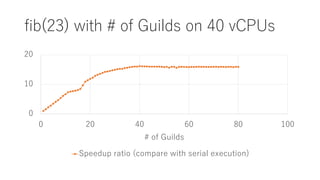
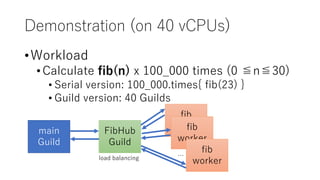
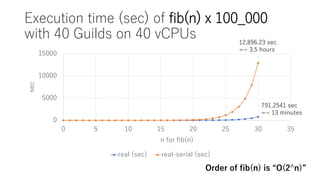
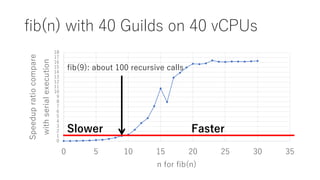
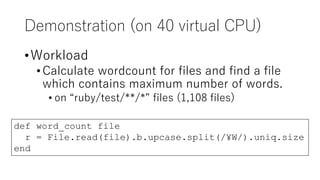
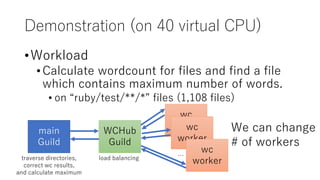
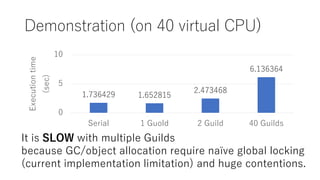

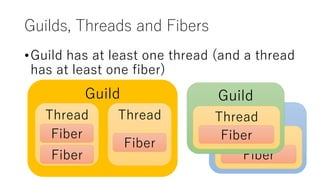
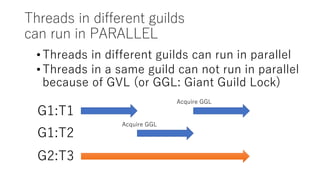
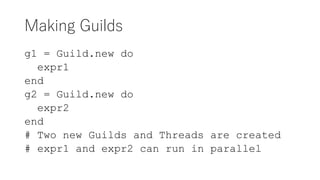
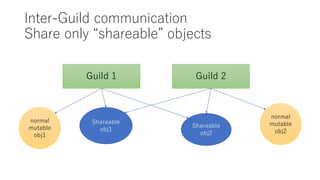
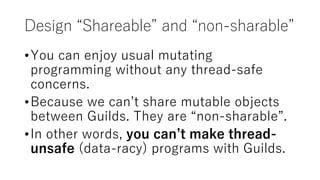
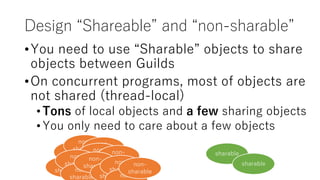
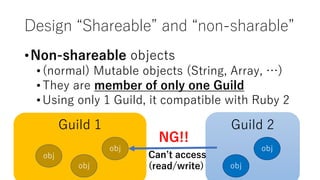
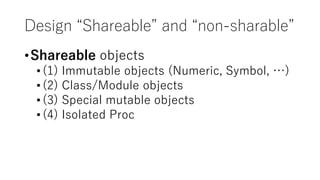
![Shareable objects
(1) Immutable objects
• Immutable objects can be shared with any guilds
• Because no mutable operations for them
• “Immutable” != “Frozen”
• a1 = [1, 2, 3].freeze: a1 is Immutable
• a2 = [1, Object.new, 3].freeze: a2 is not Immutable
• Maybe we will introduce deep freeze feature
• Numeric objects, symbols, true, false, nil are immutable
(from Ruby 2.0, 2.1, 2.2)
• Frozen string objects are immutable (if they don’t have
instance variables)](https://image.slidesharecdn.com/2018rubykaigi2018-180607124730/85/Guild-Prototype-34-320.jpg)
![Shareable objects
(2) Class/Module objects
•All objects (including any sharable objects) point
to own classes
• Good: Sharing class/module objects makes program
easier
• Bad: They can point to other mutable objects with
Constants, @@class_variable and @instance_variables
class C
Const = [1, 2, 3] # Const points a mutable
array
end
# We will introduce special protocol for them](https://image.slidesharecdn.com/2018rubykaigi2018-180607124730/85/Guild-Prototype-35-320.jpg)
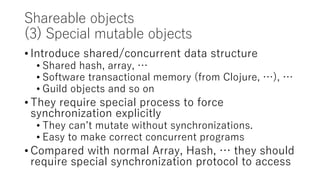
![Shareable objects
(4) Isolated Proc
•Normal Proc can point to mutable objects with
outer local variable (free-variables)
• a = []; Proc.new{p a}.call
•Introduce Isolated Proc (made by
Proc#isolate) which is prohibited to access
outer variables
a = []; Proc.new{p a}.isolate.call
#=> RuntimeError (can’t access a)
•(there are more details but skip)](https://image.slidesharecdn.com/2018rubykaigi2018-180607124730/85/Guild-Prototype-37-320.jpg)
